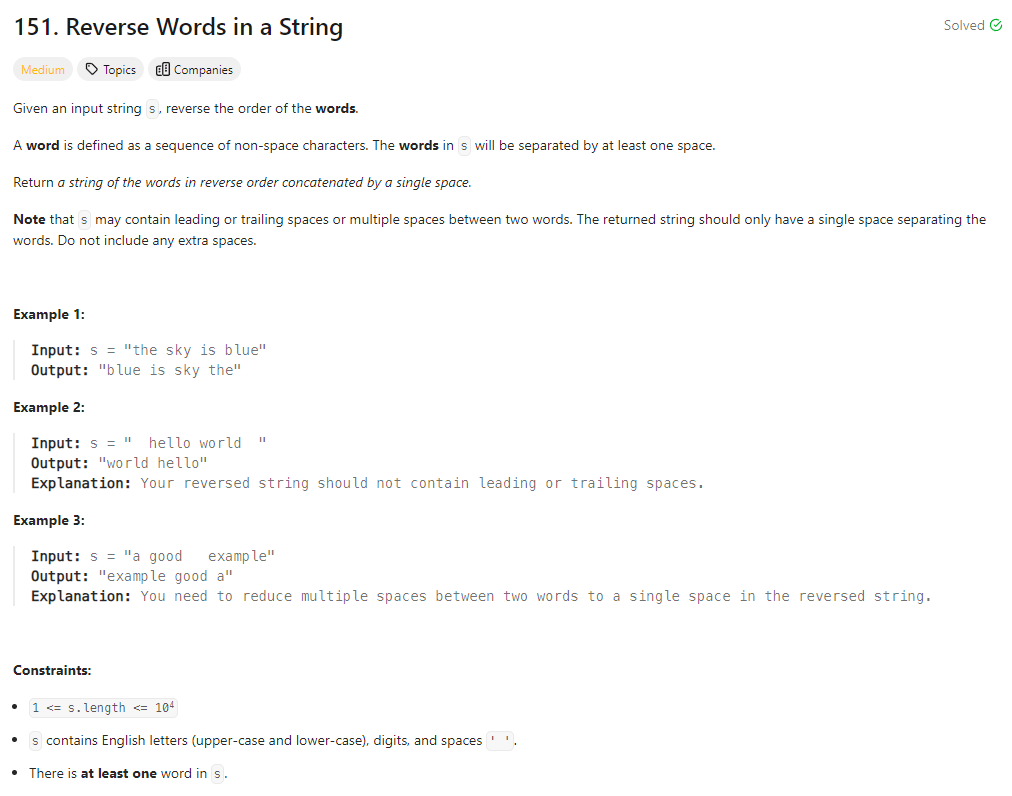Problem of The Day: Reverse Words in a String
Problem Statement
Intuition
I iterate through the given string in reverse order, identifying words and appending their reversed forms to a result list. This way, I can obtain the reversed words in the correct order.
Approach
I initialize an empty list to store the result and another list to keep track of the characters of the current word. By iterating through the input string in reverse, I identify words and add their reversed forms to the result list. Finally, I will join the reversed words to form the reversed sentence.
Complexity
-
Time complexity: O(n) where n is the length of the input string. The algorithm iterates through the string once.
-
Space complexity: O(n) where n is the length of the input string. The space is used to store the reversed words in the result list.
Code
class Solution:
def reverseWords(self, s: str) -> str:
res = []
N = len(s)
curr = []
for i in reversed(range(N)):
if not s[i].isalnum() and curr:
res.append(''.join(curr[::-1]))
curr = []
if s[i].isalnum():
curr.append(s[i])
if curr:
res.append(''.join(curr[::-1]))
return ' '.join(res)
Editorial Solution
Approach 1: Built-in Split + Reverse
class Solution:
def reverseWords(self, s: str) -> str:
return " ".join(reversed(s.split()))
Approach 2: Reverse the Whole String and Then Reverse Each Word
class Solution:
def trim_spaces(self, s: str) -> list:
left, right = 0, len(s) - 1
# remove leading spaces
while left <= right and s[left] == ' ':
left += 1
# remove trailing spaces
while left <= right and s[right] == ' ':
right -= 1
# reduce multiple spaces to single one
output = []
while left <= right:
if s[left] != ' ':
output.append(s[left])
elif output[-1] != ' ':
output.append(s[left])
left += 1
return output
def reverse(self, l: list, left: int, right: int) -> None:
while left < right:
l[left], l[right] = l[right], l[left]
left, right = left + 1, right - 1
def reverse_each_word(self, l: list) -> None:
n = len(l)
start = end = 0
while start < n:
# go to the end of the word
while end < n and l[end] != ' ':
end += 1
# reverse the word
self.reverse(l, start, end - 1)
# move to the next word
start = end + 1
end += 1
def reverseWords(self, s: str) -> str:
# converst string to char array
# and trim spaces at the same time
l = self.trim_spaces(s)
# reverse the whole string
self.reverse(l, 0, len(l) - 1)
# reverse each word
self.reverse_each_word(l)
return ''.join(l)
Approach 3: Deque of Words
from collections import deque
class Solution:
def reverseWords(self, s: str) -> str:
left, right = 0, len(s) - 1
# remove leading spaces
while left <= right and s[left] == ' ':
left += 1
# remove trailing spaces
while left <= right and s[right] == ' ':
right -= 1
d, word = deque(), []
# push word by word in front of deque
while left <= right:
if s[left] == ' ' and word:
d.appendleft(''.join(word))
word = []
elif s[left] != ' ':
word.append(s[left])
left += 1
d.appendleft(''.join(word))
return ' '.join(d)
